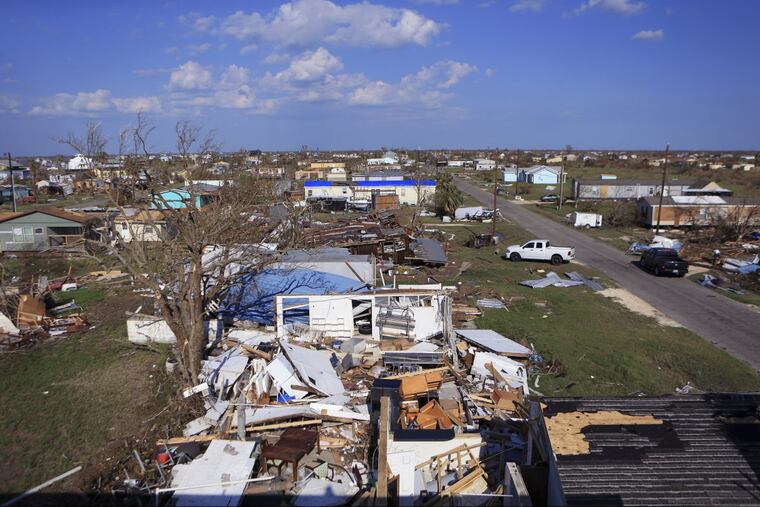What will damage from Harvey cost America?
Homeowners, industries, even towns' credit ratings will continue to feel the storm's punch, possibly for years, if the Katrina and Sandy experience holds true.

What will Harvey, the storm that flooded Houston, cost Americans?
Gasoline prices rose a dime a day on Tuesday, Wednesday, and Thursday of last week at our local Wawa, the Delaware County-based convenience-store chain that sells about one of every 100 U.S. tank fill-ups.
"That storm hit just in time for Labor Day weekend," three of the busiest driving days of the year, said Jay Hatfield, portfolio manager of InfraCap MLP ETF, a half-billion-dollar New York energy-investment fund.
Houston-area refineries prepare a third of the nation's liquid fuel. When they shut down in the flood, they stopped the supply of fuel moving north through outlets such as the Colonial pipeline. But by Friday, operators were heading back to work, with relatively little long-term refinery damage logged. "The market should clear very, very soon," Hatfield predicted. "Despite what you are reading on social media" and hearing from Texas TV speculation.
Refinery shutdowns don't just drive gas prices higher. They also slide crude-oil prices lower because there's temporarily less demand from shut refineries, and that adds to the crude-oil backlog already depressing prices, said Michael Dolega, senior economist at TD Bank.
Industry analysts sound more worried about a slowdown in Houston-area chemical-factory production of ethylene and other basics used in making plastics for cars and other U.S. industrial products.
The organic-peroxides fire and explosions at King of Prussia-based Arkema Americas' Crosby, Texas, plant provoked repeat apologies from CEO Richard Rowe to evacuated neighbors and smoked police for his company's failure to plan for such extreme flooding. He said he was sending a team of experts from King of Prussia to help recovery.
Wouldn't prevention be a better cure? Arkema, like DowDuPont and other operators of Houston-area chemical plants, has supported industry efforts to ease federal and state chemical and environmental enforcement, which have accelerated under the Republicans voters elected to top posts in Austin and Washington.
Just last winter, the Occupational Safety and Health Administration cited the Crosby plant for 10 "serious" violations, most involving hazardous-chemical mismanagement. Rowe said Friday that he didn't expect the really deadly chemicals stored there would be affected by the fire. Let's hope Arkema's crisis management is more effective than those worst-case weather projections.
Industry will likely recover faster than the "devastated communities across the Houston area," which is six times more populous than the New Orleans region wrecked by Hurricane Katrina 12 years ago, noted a report by IHS Markit, the Philadelphia- and Boston-area economics firm.
As with Katrina, and Sandy in 2012, insurers will likely be fighting customers for years over how much damage was done by wind (typically covered by homeowners' insurance policies) vs. water (covered by government-subsidized flood insurance most don't buy). Robert Hunter, a former Texas insurance commissioner, said in a report for the Consumer Federation of America that four-fifths of the Houston-area homeowners with flood damage from Harvey don't have flood coverage. He projected that homeowners — or other government aid — will have to eat $28 billion in uninsured damage.
The claims that are covered may leave the government-run National Flood Insurance Program with a bigger deficit, noted Robert Farnam, insurance analyst at Boenning & Scattergood in West Conshohocken.
Credit analysts at Standard & Poor's are already preparing to downgrade towns in the Houston area, noting in a report that "an event such as Hurricane Harvey is more likely to have long-term ramifications," keeping people away for years.
Storm, like war, allows tests of new technologies. USAA, the Texas-based financial company that focuses on military veterans, said it got 15,000 insurance claims in Harvey's first days via its mobile app and website. "A dozen of the insurer's drones are currently flying over Corpus Christi," Danni Santana wrote in the publication Digital Insurance.
Up to 500,000 Houston-area cars will be scrapped with flooded crankcases and other totaling damage, Cox Automotive estimated in a report. Commuters who need replacement junkers should boost depressed used-car prices, wrote John Rowan, analyst for Philadelphia-based Janney Montgomery Scott.